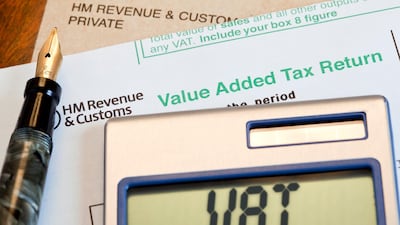Our business uses electronic services supplied by overseas companies and I have noticed some of these firms are invoicing us with UAE VAT and some aren't. Is it right that a US-based company is charging me UAE VAT? And what about the invoices where there is no UAE VAT, or, even worse, where I am charged UK VAT at 20 per cent? MT Abu Dhabi
Businesses that do not have a permanent presence and are not resident in the UAE, but make sales here, are still obligated to register for and charge UAE VAT. So it is correct that invoices, say from a US or UK company are charging you UAE VAT if their systems can determine you are resident here. I expect to see more and more overseas companies registering for UAE VAT and this will become the norm. Just ensure that the invoice shows a UAE TRN number so that you will be able to reclaim the tax charged.
Where you are receiving invoices without UAE VAT, this is deemed to be an import of services and you have to account for all the applicable tax obligations in respect to this supply under what is known as the reverse charge mechanism.
The reverse charge mechanism moves the responsibility for reporting a VAT transaction from the seller to the buyer. As the recipient of the service, you must account for the output VAT that the supplier should have charged you. You also account for the input VAT and can reclaim this in the usual way, as if it had been included on the invoice to you.
You won’t have an invoice with VAT charged, so this is just reported as an adjustment in the VAT return using specific boxes included on the VAT return for reverse charge entries. When entering the transaction into your accounting system mark it with a reverse charge VAT code so you will know to make the adjustment on your tax return.
The amount of the adjustments for input and output VAT offset each other from a cash flow perspective, but the result is that the Federal Tax Authority will have full visibility of imported services transactions.
I know some suppliers are still charging UK VAT even where they know you are a UAE business. You should work with them to see if they can invoice you without UK VAT as the service to you is an export by them and typically should be zero rated. Perhaps sending them your UAE VAT certificate and TRN may result in them not charging you UK VAT.
Unfortunately, you cannot reclaim the UK VAT on your UAE VAT return. However you need to treat the price invoiced (including the UK VAT) as the VAT exclusive price and apply the reverse charge mechanism explained above.
_______
Read more on VAT:
VAT Q&A: Should I bother registering my small business for VAT?
VAT Q&A: Can I invoice my UAE customers in US dollars rather than dirhams?
VAT Q&A: Should I pay VAT on a health club membership I paid for last year?
Dubai Economy clarifies VAT addition to Fitness First memberships
________
Since the beginning of 2018 our company has raised a couple of tax invoices with no serial number on them. From now on should we only raise tax invoices with a new serial number? And what should we do regarding the old invoices that have no serial number? HZ Dubai
Article 59, 1(d) of the Executive Regulations to the Decree Law says that all tax invoices should have either a sequential number or another unique numbering system so that each tax Invoice can be identified and the position of each invoice in the sequence of all invoices can be determined.
There are different rules depending on whether you are invoicing consumers, who are not VAT registered, or businesses, that are VAT registered and typically able to claim back the tax you charge them.
Your question leads me to ask what system or program you are using to prepare your invoices, as in my experience it’s unusual for a system to produce invoices without numbering them, unless you are preparing them manually. The VAT legislation talks about the allowable format for invoices. Ideally, invoices should be prepared directly from the accounting system you are using and either printed and given to the customer, or issued and stored electronically. You need to keep all accounting records for five years (15 years for real estate transactions) and personally I think that keeping them electronically is easier than storing files of paper, which often fade and become illegible over time.
At one of the FTA awareness sessions they advised that preparing invoices on excel would not be compliant with the legislation in terms of record keeping and invoice issuing.
In terms of the invoices that were issued without serial numbers, if practical to do so, reinvoice with the same details and date, but including a sequential number. If it’s not practical, then immediately start numbering invoices going forward but be aware this might lead to penalties if you were ever subject to a VAT audit.
Lisa Martin, a chartered accountant with over 20 years commercial finance experience, is the founder of accounting, auditing and VAT consultancy, The Counting House. Email any VAT queries to pf@thenational.ae

